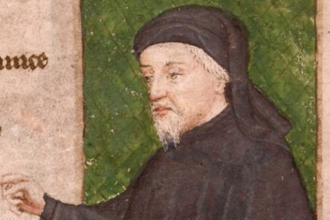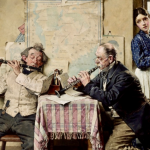James Como
Some people frolic in the European Middle Age, whereas most people hearing that designation think hair loss and weight gain. And that is too bad, because there and then resided Geoffrey Chaucer, the second greatest poet in English. If only the selective reading public knew better, they would be dazzled by his masterwork, The Book of Troilus (mid-1480s, prior to The Canterbury Tales). Moreover, we have been put on notice of its greatness, not only more than once but once again.
But not by Geoffrey Chaucer: Unveiling the Merry Bard. In it, Mary Flannery seeks to ‘unveil’ the reputation of Chaucer as a fundamentally good-humored chap, what C. S. Lewis has called our ‘supreme poet of happiness’. He is not that, we are told, in two hundred and seven pages consisting of eight chapters and much end matter. Her basic premise bubbling throughout (and sometimes boiling over) is simple: Chaucer is great, Chaucer was a mysogenist (rather than occasionally nodding to a long-standing anit-feminist literary tradition, often ironically).
Through the lense of dogma, Chaucer’s depictions of women, as well as elements of his marriage, are adduced to convict him. All close calls go against him; for example, mockery of women is sincere, recantations are not. Ambiguity is allowed, but not nuance. There is some adroit literary criticism, but the ideology, though never strident, becomes tireseome. Chapter Five, Laughing at Women, Flannery’s centerpiece, is the nutshell of her complaint. Noting the “disparities” of Chaucer’s work (and life), she allows that the bright sides are “possible” but implies they are unlikely. Since The Book of Troilus simply does not fit its own narrative devices beyond the veil of dogma, it is virtually ignored.
On the other hand, the actual reminder of the greatness of The Book of Troilus is David Wallace’s Geoffrey Chaucer: A New Introduction (ommited, » Read More
https://theimaginativeconservative.org/2025/01/chaucer-book-troilus-james-como.html
Have an existing account?
Sign In
© 2024 Paperless Times






